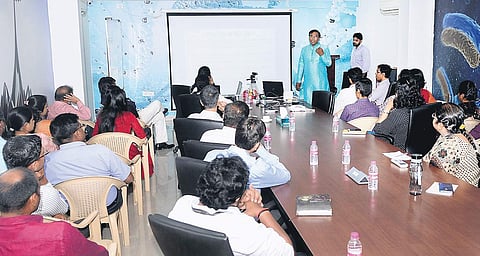

CHENNAI: A symphony of musical notes resonated through the room at RK Electro Biotechnologies Institute in Perungudi on Wednesday, as popular musician Chitravina N Ravikiran played a list of melodies for the audience to interpret.
“Tell me what you feel when you hear this piece,” he said and began to play the flute. The audience listened attentively to the soft and slow music, and most felt a wave of calmness wash over them, including us. “I feel refreshed and peaceful, like after I wake up from a relaxing nap,” said someone from the audience. He then proceeded to play a piece of metal music and asked for an opinion. Some audience members felt cautious while some felt hassled. “This is the power of music. It can affect your sub-conscience through a series of notes and vibrations by triggering the release of certain hormones in your body,” said Ravikiran.
Speaking to a room full of biotechnologists, music enthusiasts and research analysts, he explained that sound effects have been an active part of translating emotions. In movies, the sound of a spring bouncing off, is indicative of a comedic scene while peppy, up-beat music could indicate a happy occasion or celebration.
He gave the example of first listening to the dialogues of a horror movie and then watching it on mute. “Of course, listening to that eerie laughter or the deep tones of a pipe organ raises goosebumps right away, but watching it on mute could just transpire into a series of comical events,” he said.
Ravikiran calls his field of study, musopathy. It has been a part of eastern and western medicine for centuries and Science is now catching up to explain and quantify the phenomenon, he said. “Music appeals to every individual differently. Depending on how one relates to a particular melody, their body reacts accordingly by releasing certain hormones,” he said, adding that musopathy tries to quantify the properties of music to apply them in remedies.
As the audience listened intently to his speech, Ravikiran said that most systems of music work with 12 notes over multiple octaves to form a melody — the only exception being Arabic music which works with over 30 notes. “Music supercedes the mood. It doesn’t matter what you may have experienced just before listening to the music. Your interpretation of the tune is free of any prior emotional state,” he said.
Ravikiran is currently conducting an in-depth research in Gujarat to test the effect of tempo, volume, percussion and melody on a group of volunteers. He is further combining chords from western music and individual notes from eastern music to form a ‘Melharmony’ which collectively produces notes which receive standard reactions. “I want to expose the possibilities of study and research in musopathy to specialists who can apply it practically,” he said.